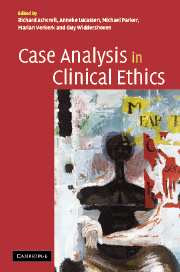Book contents
- Frontmatter
- Contents
- Notes on contributors
- Acknowledgements
- 1 Philosophical introduction: case analysis in clinical ethics
- 2 Families and genetic testing: the case of Jane and Phyllis
- 3 Family access to shared genetic information: an analysis of the narrative
- 4 A virtue-ethics approach
- 5 Interpretation and dialogue in hermeneutic ethics
- 6 ‘Power, corruption and lies’: ethics and power
- 7 Reading the genes
- 8 A utilitarian approach
- 9 A feminist care-ethics approach to genetics
- 10 A conversational approach to the ethics of genetic testing
- 11 Families and genetic testing: the case of Jane and Phyllis from a four-principles perspective
- 12 A phenomenological approach to bioethics
- 13 An empirical approach
- 14 Response to ethical dissections of the case
- 15 Philosophical reflections
- Index
- References
3 - Family access to shared genetic information: an analysis of the narrative
Published online by Cambridge University Press: 01 September 2009
- Frontmatter
- Contents
- Notes on contributors
- Acknowledgements
- 1 Philosophical introduction: case analysis in clinical ethics
- 2 Families and genetic testing: the case of Jane and Phyllis
- 3 Family access to shared genetic information: an analysis of the narrative
- 4 A virtue-ethics approach
- 5 Interpretation and dialogue in hermeneutic ethics
- 6 ‘Power, corruption and lies’: ethics and power
- 7 Reading the genes
- 8 A utilitarian approach
- 9 A feminist care-ethics approach to genetics
- 10 A conversational approach to the ethics of genetic testing
- 11 Families and genetic testing: the case of Jane and Phyllis from a four-principles perspective
- 12 A phenomenological approach to bioethics
- 13 An empirical approach
- 14 Response to ethical dissections of the case
- 15 Philosophical reflections
- Index
- References
Summary
Narratives are the discursive form in which issues in medical ethics are apprehended, and communicated. What stories do ‘is to narrate the life in time’ (Forster 1971), not just in novels, but also in fact. Narrative discourse – ‘someone telling someone else that something happened’ (Smith 1981) – is an archetypal means of relating and reporting what is going on, one which also patterns understanding of events.
Many stories turn on conflicts of value, clashes of principle and the promise of resolution. Literature, understood broadly to include novels, biography, memoirs and journalistic accounts, offers readers and professional ethicists alike, potentially rich representations of situations finely graduated by moral viewpoint, ambiguity and complexity (Widdershoven and Smits 1996, Widdershoven and Sohl 1999). Literature can also depict and explore moral doubts and reasoning, and subject argument, motive and character to the scrutiny of a wide readership. In these ways stories both embody and structure our encounters with notions of ‘right’ and ‘wrong’ (MacIntyre 1981: 201, Guroian 1998).
Some narrative scholars argue that ‘the most interesting parts of the moral world have to be ‘read’, rendered, construed, glossed, elucidated, and not merely described’ (Walzer 1987) and find that novelists have more to teach them than philosophers about how to grapple with moral complexities (Booth 2002). Comprehending the moral content of stories involves making sense of feelings, thoughts and behaviour which engage narrative skills, knowledge of the fine grain of medical case histories and some fluency in philosophical analysis too (Levine 1998: 43).
- Type
- Chapter
- Information
- Case Analysis in Clinical Ethics , pp. 27 - 44Publisher: Cambridge University PressPrint publication year: 2005
References
- 1
- Cited by



